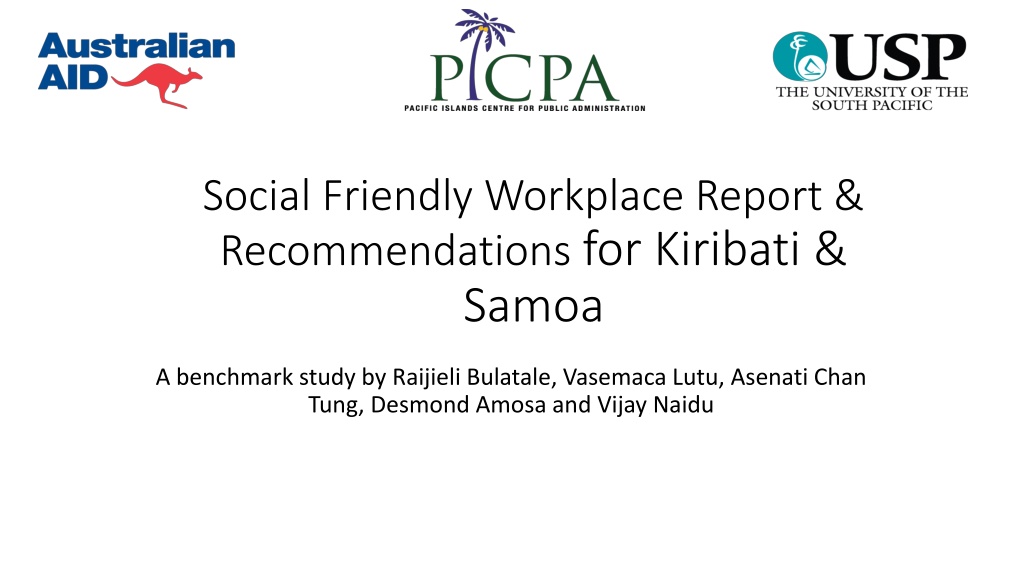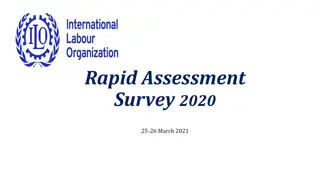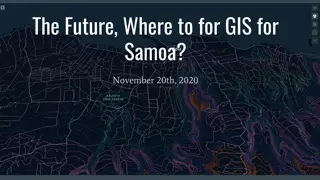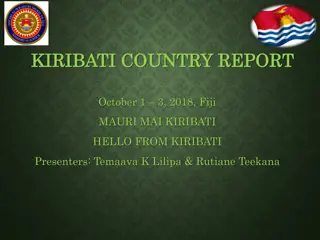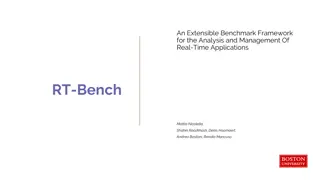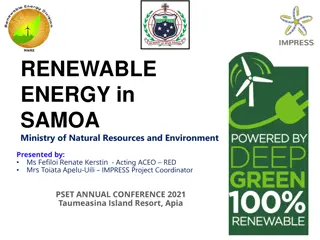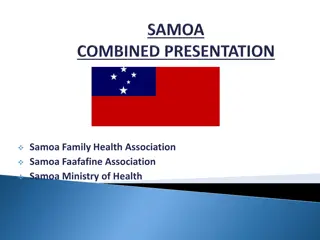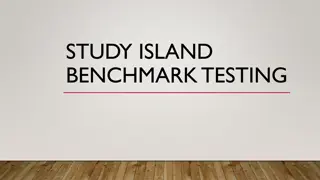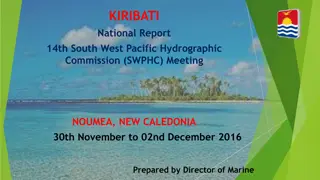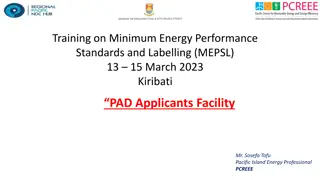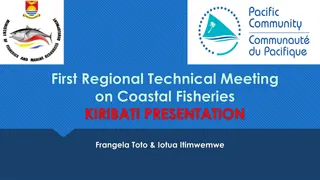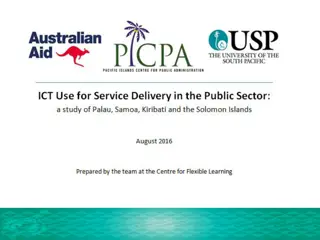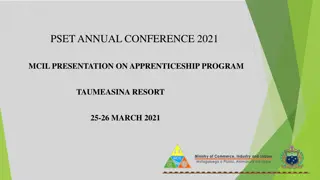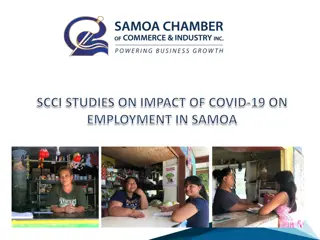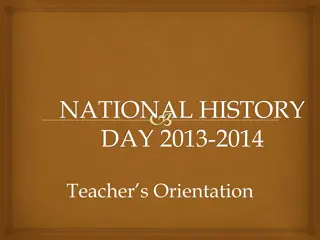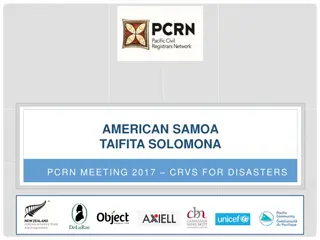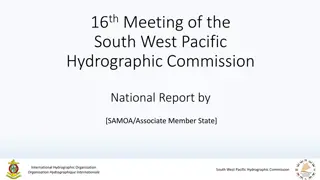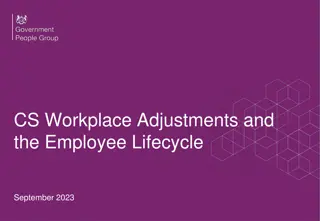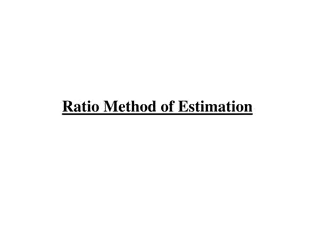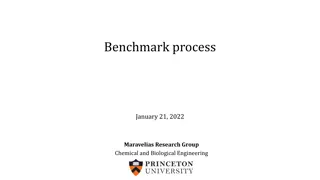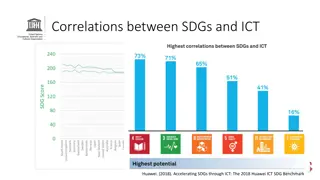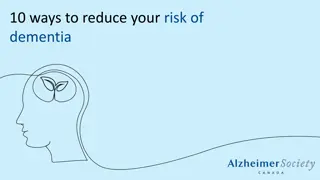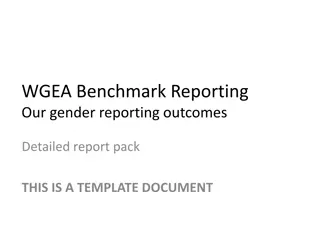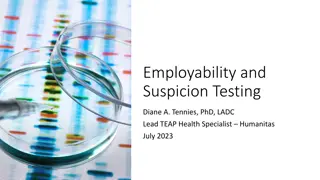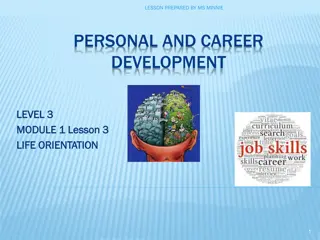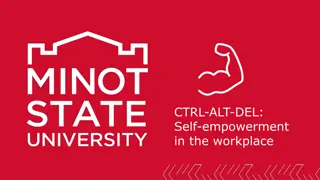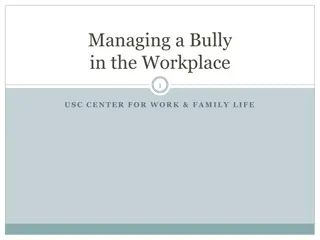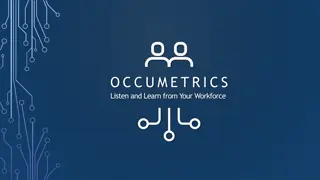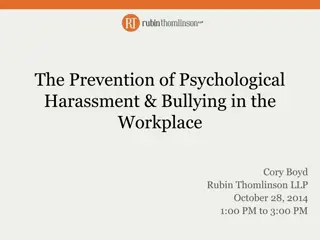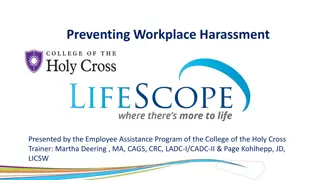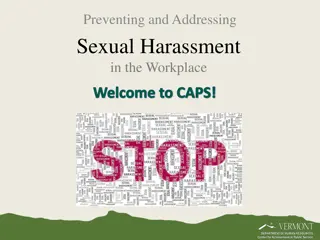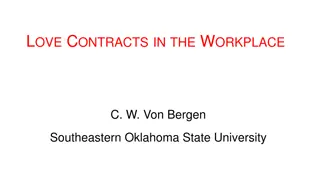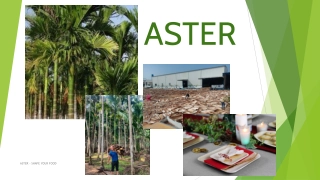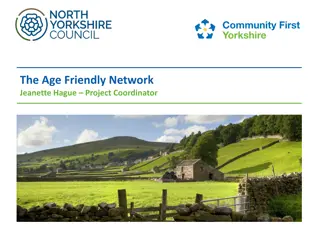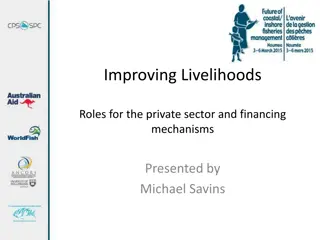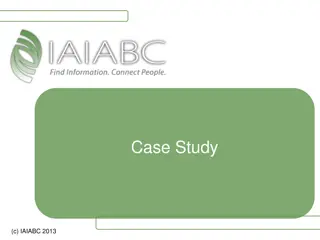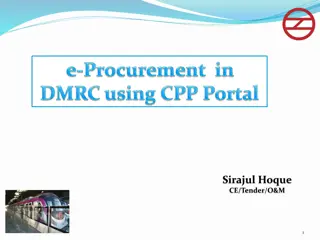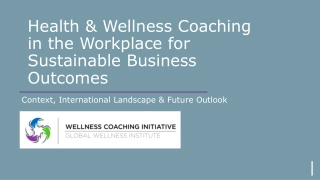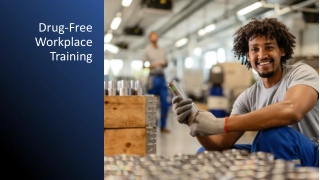Benchmark Study on Socially Friendly Workplace in Kiribati & Samoa
This benchmark study by Raijieli Bulatale, Vasemaca Lutu, Asenati Chan Tung, Desmond Amosa, and Vijay Naidu focused on evaluating policy implementation in socially friendly workplace areas like child protection, gender mainstreaming, and more in Kiribati and Samoa. Researchers used various instruments including questionnaires, interviews, and focus groups to gather insights from respondents in relevant ministries and NGOs. The study aimed to provide recommendations for bridging gaps and enhancing workplace friendliness in these Pacific Island countries.
Download Presentation

Please find below an Image/Link to download the presentation.
The content on the website is provided AS IS for your information and personal use only. It may not be sold, licensed, or shared on other websites without obtaining consent from the author. Download presentation by click this link. If you encounter any issues during the download, it is possible that the publisher has removed the file from their server.
E N D
Presentation Transcript
Social Friendly Workplace Report & Recommendations for Kiribati & Samoa A benchmark study by Raijieli Bulatale, Vasemaca Lutu, Asenati Chan Tung, Desmond Amosa and Vijay Naidu
Overview of Presentation Overview of Presentation Research Objectives & areas of research Time of Research & Research Approach & Research Instruments Researchers & Research Respondents Key Findings of Research in Kiribati Study Key Findings of Research in Samoa Study Addressing Gaps in Socially Friendly Workplace Recommendations & possible action by PICPA
Research Objectives & Areas of Research Research Objectives & Areas of Research Overall objective of PICPA in conducting research was to benchmark policy & policy implementation in areas identified in social friendly workplace Areas of Research were: (a)Child protection (b) Gender Mainstreaming (c) Domestic & Sexual Violence, (d) Disability (e) Climate Change (f) Occupational Safety & Health PICs in research : Kiribati, Palau, Samoa & Solomon Islands
Time of Research & Research Approach & Research Time of Research & Research Approach & Research Instruments Instruments Field Research was conducted in the month of May, 2016 (Kiribati, 19- 26 May; Samoa, 2-21 May) Approach taken was Positive Appreciation predicated on appreciation of work done in the areas of research in respective public services 4 research instruments used: 1. Documents (including on gov t website); 2. Semi-Structured Questionnaire; 3.Individual interviews ; 4. Focus Groups
Researchers & Research Respondents Research team comprised Professor Vijay Naidu (leader), Dr Asenati Chan Tung, Associate Professor Anand Chand, Dr Gordon Nanau, Dr Suwastika Naidu, Ms Raijieli Bulatale, Ms Vasemaca Lutu, & Dr Desmond Amosa Dr Asenati Chan Tung led the Samoa study & Ms Raijieli led the Kiribati study Respondents were primarily from relevant Ministries/Departments in areas of research Kiribati 7 of these and 3 NGOs including Red Cross, 29 completed questionnaires; Samoa 12 Ministries, 31 completed questionnaires; 13 interviews.
Key Findings of Research Key Findings of Research - - Kiribati Kiribati 1. Child Protection Although the Children, Young People and Family Welfare Act, 2013 & Children, Young People and Family Welfare Policy, 2013 cover mandate for social welfare officers to intervene when parents commit violence against children, there are still some weaknesses. (PICPA can play supportive role) Messages need to be elaborated properly, sometimes confusion is created and conflict arises in regardsto culture. They are not enforced e.g. Education & care, policy is not active (recommendation to recruit protection officersso as create awareness & advocacy in child protection) Outreach to teach & train young people(more awareness campaigns) Provide more capacity training to WDD staff on Gender Analysis, Gender Responsive Planning & Project Monitoring & Evaluation Provide training on developing a Sex Disaggregated Data Provide budget for the implementation of the Policy. 2. Gender Mainstreaming 3. Domestic Violence There needs to be a specific policy to prevent sexual harassment & protect domestic violence victims at work Develop a specific domestic & sexual violence policy in the Ministry.
4. Disability Technical assistance to the Senior Disability Inclusive Officer, MWYSA needed in implementing an inter-governmental awareness campaign in conjunction with awareness campaigns in private businesses.(PICPA supportive role?) As a role model, MWYSA is slowly taking effective steps to create a more accessible workplace for persons with a disability. MWYSA aims to be disability inclusive, not only in its attitudes but also in its policies & work environment. Expediting the process to allow MWYSA to strengthen its position on disability in order to create a strongeradvocacy & monitoring base in the future. (PICPA support?) There is commitment to address CC issues, but there are gaps. Need further commitment especially from communities, & some government officials. Collaboration & coordination is a significant gap. Strengthen climate change taskforce, sharing of resources, improvising ways to adapt by recycling, resource sharing Strengthen awareness & communication to inform community of CC effects/impacts & their vulnerabilities. Liaise with Ministry of Environment & Office of the President, resource materials for community awareness & display, capacity building on adaptation measures, funding for clean-up, work with KRC on the ground for disaster preparedness & build capacities to respond to risk with volunteers trained in First Aid, Disaster Management & Health matters. 5. Climate Change 6. OHS This is a new Act; Capacity building & enforcement. Develop new OHS Policy Standards, funds for training staff; Maternity leave for KRC staff.
Key Findings of Research Key Findings of Research - - Samoa Samoa Summary of Findings 1. CHILD PROTECTION Existing Gaps Insufficient knowledge among public officials about specific programmes in place, and about the nature of their success or failure. This is seen mainly as a result of the lack of effective communication among ministries and other stakeholders. i. Government official are aware of legislations & policies, including the CRC which Samoa ratified in 1994. Respondents could identify relevant legislations related to child-protection ii. There is also good knowledge about the multi-sectoral approach taken in the implementation of legislations and policies. iii. The Samoa National Policy for Children 2010-2015 has strengthened the monitoring & assessment of child protection legislation. iv. MWCSD has a Child Protection Unit which runs community awareness programs. Programs promote children s rights to be free from abuse and violence, and provide advise to parents on positive disciplinary measures for children.
2. GENDER MAINSTREAMING Respondents indicate that gender mainstreaming is not a priority concern for the ministries. i. All the Ministries in the study do not have policies on gender mainstreaming. The area of LGBTQI is not considered in policies at all. iii. The Ministry of Finance indicated that whilst there is no explicit policy, GM is embedded into their corporate culture that all staff and customers are treated equally and fairly regardless of gender/sex. iv. The Women s Division of MWCSD s coordinates the implementation of the National Policy for Women. v. Government officials expressed an understanding of what GM is. Eg/equal pay for women and men for work of similar nature; equal opportunity for women and men to be considered for a position. vi. Gender mainstreaming is perceived to be a new area for government and officials are not clear about what it entails. ii. There is a lack of appreciation of gender as a fluid concept and reality, beyond the traditional women and men dualism. The subject of LGBTQI employees is considered irrelevant to the public service.
3. DOMESTIC & SEXUAL VIOLENCE Public officials are not immune to domestic and sexual violence. This area is not addressed in the existing Code of Conduct for public servants. i. Public servants are well aware that Samoa has ratified the CEDAW. ii. Ministries do not have specific policies on sexual violence. The Code of Conduct stipulated in the Public Service Act 2004 does not consider domestic and sexual violence involving public employees. Emphasis is placed on the importance relationships among public servants. iii. Known cases of domestic violence involving government officials are referred to the Ministry of Police for investigation. of respectful
4. DISABILITY Not all ministries mainstream disability in their corporate plans. i. Public officials are aware of the National Policy for Persons with Disability. Only a handful of them (5 out of 31) expressed knowledge of what the policy covers: advocacy & awareness, early detection & intervention, independent living & economic development, provision of support services & assistive devices, education, & access to information & infrastructure. MWCSD runs the Samoa Disability Program & is the national Focal Point for Persons with Disabilities. Its Disability Unit coordinates the implementation of the National Policy. iii. Attempts to mainstream disability in policies have taken place with some government ministries (eg/MOF, PSC, MCIL, MESC, MOH). The focus is on the provision of equal employment opportunities for people with disabilities, support services & improving physical accessibility for them. iv. MESC has in place an Inclusive Education Policy Service delivery and implementation seem to fall heavily on ministries are not always in the picture. MWCSD. Partner ii. Lack of capital and human and resources for The Disability programs in core areas such as women with disabilities, economic development and accessibility. Unit to support
5. CLIMATE CHANGE There is a general awareness about the climate change programme receiving large funding support from development partners. But there is a lack of transparency on how this money is used; which projects and programmes it is used for, and their outcomes. i. Public servants have a strong sense of support for government policy for combating climate change. ii. Government has taken a multi-sectoral approach to improving adaptation to climate-related changes affecting the country. MOF and MNRE are coordinating ministries in this effort. iii. Specific to the Ministry of Finance is the Strategy for the Development of Samoa (SDS) 2012-2016 which includes strategic outcomes for ensuring resilience. Furthermore, climate considered a cross cutting issue and is thus incorporated into the strategic direction of all sectors. iv. Ministry of Finance has a Climate Resilience Investment and Coordination Division, which coordination of climate related programmes and investments. v. Compared other areas in the study, climate change-related programmes and projects receive the biggest amount of funding, primarily from aid donors. climate change and resilience disaster is Although the role of the leading ministries (MOF & MNRE), that of the other ministries is vague. Officials from the latter seem to have little knowledge on their expected input to climate change programmes. is responsible for the
6. OCCUPATIONAL SAFETY & HEALTH Legislations, Policies & Plans - Occupational Safety and Health Act 2002 - National Health Service Act 2014 - Labour and Employment Relations Act 2013 - Corporate Plan 2012-2016 The assumption in the legislations and corporate plans of key ministries such as MCIL, is that the employee is an able- bodied person with no special needs in the workplace. This leaves out the concerns among persons with disabilities who are more prone to harm from work-related accidents. Legislations do not specify ways in which a government employee with disability is protected or their rights to compensation. There is an accident compensation scheme mandated by the Accident Compensation Act 1989 which provides social insurance and covers areas such as prevention, compensation and rehabilitation in terms of workplace accidents. The Ministry of Commerce, Industry and Labour supervises the safety of workplaces and impose penalties for non- compliance with standards and provisions of the Act and Regulations. Within individual ministries, OHS issues are specific to things like the availability of fresh drinking water, suitable sanitation facilities, and access to first aid resources. Generally these are adequately provided for.
Addressing Gaps in Socially Friendly Workplace Child Protection in Samoa -insufficient knowledge about effectiveness of programme coordination. Establishing a mandatory role for coordinating ministries to report to, and receive feedback from stakeholders. Communication & Information sharing-MWCSD s newsletters, with updates on child protection activities, circulated more widely among stakeholders including NGOs & private sector partners. Gender mainstreaming cross cutting, therefore should be included in all Ministries SPs. MWCSD s Strategic Plan 2013-2017 can serve as a model for other ministries. PICPA to conduct workshop training on key areas of gender-responsive policy, research & analysis; gender budgeting & gender audit. Gender Position, especially critical for ministries like MAF, MWTI, MNRE, MESC, MOH and MCIL, -unfamiliarity with gender mainstreaming.
Addressing Gaps in Socially Friendly Workplace Domestic and sexual violence Provisions of Family Act 2013), not stipulated in policies of ministries. PSC Code of Conduct (CC) is guide officials behavior; does not specify gender violence as breaches. PSC Code of Conduct could be amended for explicit reference to domestic & sexual violence as a breach of public servants CC. Ministries to periodically review progress on this aspect of CC to support key goal of National Policy for Women to eliminate domestic violence. Disability - National Policy for People with Disabilities is not incorporated in ministries plans and workplace policies. Mechanisms be put in place to broaden awareness among government officials on how disability can be mainstreamed in plans & in recruitment & service policy. MCIL, as the ministry in charge of labour issues, be encouraged to take a leading role with PSC, in monitoring compliance by all ministries.
Addressing Gaps in Socially Friendly Workplace Climate change- Possible study to assess effectiveness of multi- sectoral approach to combating climate change. Concerns over lack of transparency in the way programmes are funded with no regular update or review Scope for technical assistance & advice with MNRE in the preparation of a new greenhouse gas inventory needed for Samoa s Third National Communication on Climate Change. Inventory results would determine the priority areas for awareness programmes. Occupational Safety and Health Ministries be more explicit in their corporate plans and workplace policies on OHS conditions relating to people with disability. Help to measure the level of seriousness about Disability and OHS as intersectional areas for policy concern.
Recommendations & possible action by PICPA Two countries public services broadly have policies for Social Friendly Workplace with regards to 6 topics researched. Very positive. Implementation issues in workplace & wider community include: 1. Cross cutting matters that require whole of government approach for instance gender mainstreaming. 2. Capacity building & training in a number of areas needed for expeditious implementation 3. Communication intra-governmental & in wider community on Social Friendly Workplace topics to generate awareness, commitments, engagement. 4. Partnership with CSOs, NGOs & Private Sector 5. Resourcing & Funding
